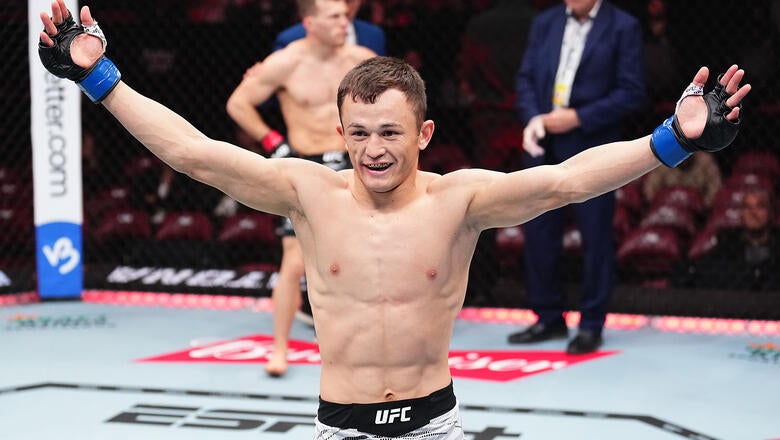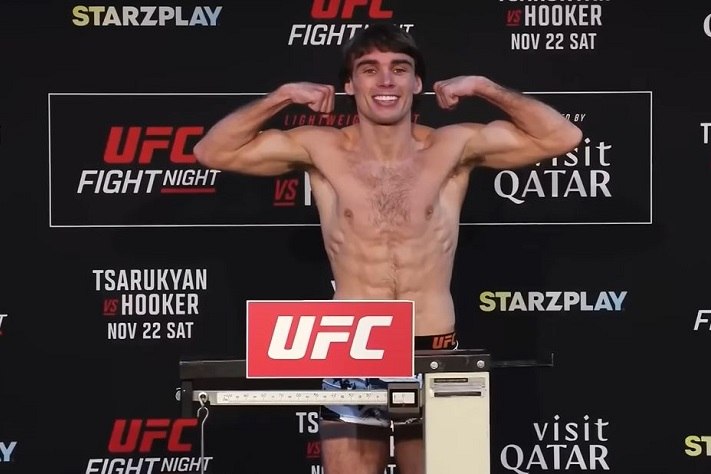The Calculated Unveiling: Luke Riley’s Entry into the UFC
And so, another hopeful steps into the gladiatorial pit, bathed in the manufactured glow of expectation, and this time it's Luke Riley, the 'striking version' of none other than Paddy 'The Baddy' Pimblett, a narrative thread deliberately woven to maximize immediate intrigue and fan engagement, because let’s face it, in the attention economy, a fighter is only as good as the story they tell before they even throw a punch.
Think about it.
Because this isn’t simply about a young fighter making his professional debut on the grandest stage; it’s a meticulously orchestrated unveiling designed to leverage an existing, albeit polarizing, star's influence, positioning Riley not just as a new face, but as a direct spiritual successor, a tactical shortcut to relevancy that bypasses the organic grind many fighters endure, thereby placing an almost insurmountable weight of expectation on his relatively untested shoulders right out of the gate.
It's a shrewd move.
And historically, the UFC, a master of narrative construction, has always understood the power of a strong storyline, particularly when it involves an heir apparent or a protégé from a popular camp, turning what could be a forgettable preliminary bout into a must-watch event for those eager to witness either the birth of a new phenomenon or the inevitable crash and burn of overblown hype, which, let's be honest, is often just as entertaining for the ravenous masses.
But this isn’t amateur hour.
Because the annals of MMA are littered with the crumpled aspirations of fighters who arrived with immense fanfare, only to discover that the bright lights of the UFC Octagon are far more unforgiving than any regional circuit, exposing every flaw and amplifying every misstep with brutal efficiency, leaving many to wonder if their meteoric rise was nothing more than a carefully constructed illusion designed to sell pay-per-views rather than cultivate genuine talent.
Some prospects just fade.
And Pimblett's endorsement, while undoubtedly a boon for Riley's visibility, also carries a dangerous double-edged sword, for if Riley fails to live up to the lofty 'striking version of me' comparison, or worse, if he flounders under the intense scrutiny that such a comparison invites, the blowback could be immediate and severe, effectively crushing his nascent career before it even has a chance to properly bloom, a common hazard in the cutthroat business of combat sports where perception often trumps reality.
It's a dog-eat-dog world.
Because every time a new fighter emerges with such a strong, pre-packaged narrative, the cold strategist in me can’t help but dissect the commercial implications, seeing not just a fighter, but a potential product line, a marketing opportunity to be exploited for maximum value, and Riley, whether he knows it or not, is now inextricably linked to the ‘Baddy’ brand, for better or worse, a situation that could either propel him to stardom or forever brand him as nothing more than a footnote in someone else’s story.
The stakes are high.
And while the romantic idealists among us might champion the notion of raw talent overcoming all obstacles, the pragmatist understands that in modern professional fighting, particularly within the UFC's dominant ecosystem, a fighter’s trajectory is often less about their skill and more about the strategic placement, the carefully managed opponent selection, and the compelling backstory that resonates with a global audience, all of which contribute to their marketability and ultimately, their longevity in the unforgiving fight game.
It’s a game of chess.
The Global Chessboard: UFC Qatar and Regional Ambitions
But the stage for Riley’s debut, UFC Qatar, isn’t some arbitrary locale; it represents a crucial strategic outpost in the UFC’s relentless global expansion, a deliberate push into burgeoning markets where the potential for new viewership, sponsorship revenue, and talent acquisition is immense, making every fighter on that card, especially those with an intriguing storyline like Riley’s, a pawn in a much larger, intricate geopolitical chess match.
It’s all about reach.
Because the deployment of a full UFC fight card in a region like Qatar, with its significant investment in global sports and entertainment, is not merely about hosting a spectacle; it’s about embedding the brand, cultivating a new generation of fans and aspiring fighters, and ultimately, securing a foothold in territories ripe for market penetration, thereby ensuring the continued dominance and financial prosperity of the promotion for decades to come, a vision far grander than any single fighter’s personal aspirations.
The vision is clear.
And for a fighter like Luke Riley, hailing from the UK, a nation with a fervent and rapidly growing MMA fanbase, his inclusion on a card like UFC Qatar serves multiple purposes: it showcases international talent, provides a relatable figure for the European audience, and subtly reinforces the UFC's commitment to developing and spotlighting fighters from diverse geographic backgrounds, aligning perfectly with their long-term strategy of becoming a truly global sports behemoth.
He’s a piece of the puzzle.
Because consider the long-term implications: if Riley performs spectacularly, perhaps even securing that 'knockout debut' he's been envisioning, it doesn’t just elevate his stock; it bolsters the narrative of UK talent, potentially paving the way for more British fighters to be fast-tracked into high-profile international cards, creating a positive feedback loop that strengthens the brand's presence in a key European market, a masterclass in leveraging individual performance for collective strategic gain.
It’s a calculated risk.
And this isn’t merely conjecture; it’s a pattern observable throughout the UFC's history, from their early forays into Brazil with legends like Anderson Silva and Jose Aldo, to their strategic cultivation of Canadian stars like Georges St-Pierre, all designed to create regional heroes who could draw massive crowds and expand the sport's footprint beyond its American origins, transforming what was once a niche spectacle into a mainstream global phenomenon worth billions.
The template exists.
Because every fighter, whether they are aware of it or not, becomes a vessel for the promotion's broader ambitions, their individual journey intertwined with the organization's strategic objectives, and Riley’s moment in Qatar is therefore not just a personal milestone, but a data point in the UFC's ongoing geopolitical mapping, a test of market response, and a calculated investment in future revenue streams, far more complex than just two men locked in a cage.
It's a grand design.
And one could argue that the ultimate success of UFC Qatar, and indeed any international venture, hinges less on the individual outcomes of its fights and more on the aggregate impact it has on local engagement, media coverage, and the perception of the UFC as a legitimate, entrenched sporting entity, making fighters like Riley unwitting, yet crucial, ambassadors in a relentless quest for global sports dominance, where every punch thrown contributes to the bottom line.
Every punch matters.
The Unforgiving Arc: Predicting Riley’s Future in the Cold Light of Strategy
And now for the cold, hard truth: Luke Riley’s future in the UFC, despite the current wave of hype and the strategic positioning, hinges entirely on a brutally simple yet monumentally complex variable – his performance, because in this business, the only currency that truly matters beyond the manufactured narratives and strategic placements is the ability to consistently win, and to do so in spectacular, compelling fashion that makes people want to keep watching.
Results dictate destiny.
Because even with Pimblett’s powerful endorsement echoing in the background, the unforgiving nature of the Octagon will quickly strip away any borrowed glory, revealing whether Riley possesses the inherent talent, the mental fortitude, and the sheer grit required to navigate the perilous waters of a professional MMA career, a journey fraught with unpredictable injuries, devastating losses, and the constant pressure to evolve in a sport where stagnation is a death sentence.
It’s a brutal grind.
And while a knockout debut would certainly set the internet ablaze and amplify the ‘Pimblett 2.0’ narrative, thereby buying him considerable goodwill and perhaps a slightly gentler matchmaking curve for his next few bouts, the long arc of a fighter’s career is rarely defined by a single impressive performance, but rather by their resilience in the face of adversity, their capacity to learn from mistakes, and their ability to stay relevant in an ever-churning roster of hungry contenders.
Consistency is king.
Because we’ve seen it countless times: fighters rocket to prominence on the back of a few flashy wins, only to crumble under the weight of increased competition or a sudden dip in form, proving that sustaining success in the UFC isn’t just about being good; it’s about being exceptional, adaptable, and possessing an unshakeable belief in oneself when the lights are brightest and the stakes are highest, a psychological battle as much as a physical one.
The mental game is real.
And considering his connection to Pimblett, there’s an implicit expectation that Riley will not only win but will do so with a similar flair and aggressive striking style, which, while entertaining, can also leave him vulnerable to skilled counter-strikers or opportunistic grapplers, a calculated risk that could either define him as a star or expose the limitations of being pigeonholed into a specific fighting persona before his true identity as a martial artist has fully matured.
He’s walking a tightrope.
But from a cold, strategic perspective, if Riley can indeed deliver on the promise, if he can parlay the initial hype into a genuine, sustained winning streak, then the UFC’s calculated gamble will pay dividends, creating another marketable star from the lucrative UK market, deepening their talent pool, and validating the effectiveness of using established personalities to launch new ones, a formula that has proven incredibly potent in the entertainment industry beyond just combat sports.
It’s a proven model.
And conversely, should Riley falter, should he prove to be merely an echo rather than an original voice, the UFC machine, ruthless and unsentimental, will simply pivot, moving on to the next promising prospect, because in the grand scheme of their global expansion and billion-dollar valuations, individual fighters are ultimately expendable commodities, and the show, as they say, must always go on, a stark reminder of the brutal realities that underpin the dazzling spectacle.
The machine keeps turning.
Because ultimately, Riley’s journey isn’t just his own; it’s a living case study in the intersection of athletic ambition, strategic marketing, and the relentless, unforgiving nature of top-tier professional sports, where every punch thrown and every decision made reverberates through a complex web of financial implications, brand narratives, and the eternal quest for dominance, proving that even the most personal fight is always part of a much larger, colder game.
It always is.


